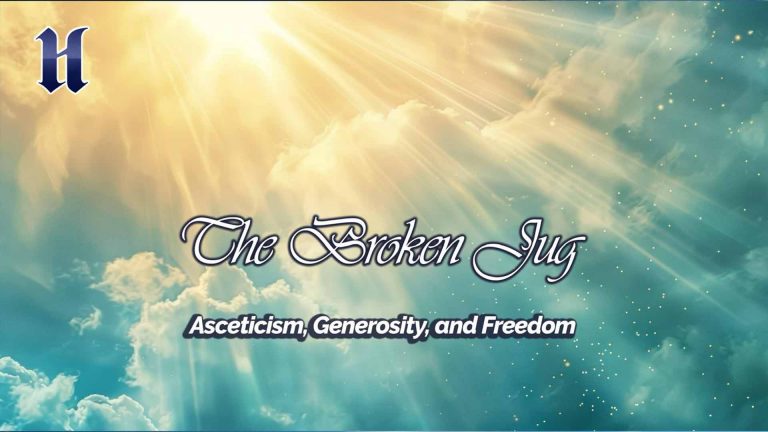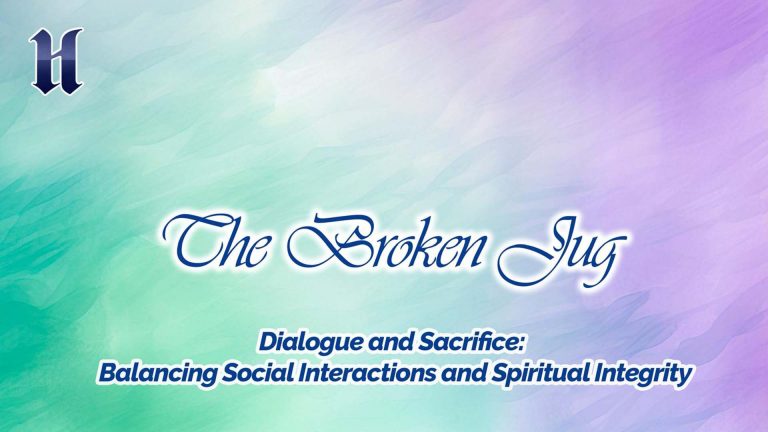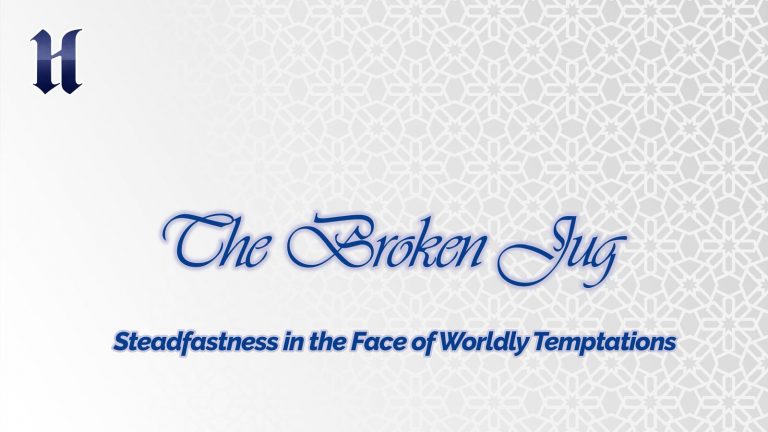Question: How should we understand the hadith that states “Paradise is surrounded by ‘disliked things’ and Hell is surrounded by ‘desires’?
Answer: The hadith mentioned in the question is a widely recognized and authentic narration that has been transmitted by both Imam Bukhari and Imam Muslim. Furthermore, it serves as an excellent illustration of the eloquence found in the speech of the Prophet (peace be upon him), succinctly conveying profound truths with brevity, with few words, just as in some of his other hadiths.
The text of the hadith is as follows: ‘Paradise is surrounded by disliked things (meaning things that do not please the self), and Hell is surrounded by physical desires and appetites.’ (Bukhari, rikak, 28; Muslim, cennet, 1)
What the hadith intends to convey is as follows: Paradise is surrounded by things that are displeasing to the self, things that the self finds burdensome. When a person resists the temptations and fulfills their obligations as a servant of God, they attain Paradise. On the other hand, Hell is enveloped by things that please the human self. By following their desires and whims, a person ultimately ends up in the depths of Hell.
In order to better understand the hadith, it is beneficial to delve briefly into the words that the Prophet (peace be upon him) chose to use in conveying the message, namely “makârih” and “shahawat.”
The word “makârih” is the plural form of “makreh,” which is derived from the same root as the commonly known term “makruh” (reprehensible, detested, discouraged). “Makârih” refers to things that are displeasing to the self, burdensome, and involve difficulty and hardship in their execution. In the Quran, we can find a similar usage of the root word and its related attributes in the following verse:
“Fighting has been enjoined upon you while it is hateful to you. But perhaps you hate a thing and it is good for you; and perhaps you love a thing and it is bad for you. And Allah Knows, while you know not.” (Surah al-Baqara, 2:216)
Now, with this understanding of the words, we can reiterate the meaning of the hadith: Paradise is surrounded by those things that are displeasing to the self, things that the self finds burdensome. When a person resists these hardships and fulfills their obligations as a servant of God, they attain Paradise. In contrast, Hell is encircled by things that please the human self. By following their desires and whims, a person ultimately ends up in the depths of Hell.
Each of the matters that require patience falls into the category of “makârih” in this sense. This means that enduring the hardship and difficulty of worship and obedience, resisting sinful acts despite bodily and worldly desires, facing adversities and calamities with patience and contentment are among the most crucial aspects that lead one to Paradise. The self does not favor such hardships. Bearing with difficulties and overcoming obstacles feels burdensome to it. This hadith informs us that Paradise is surrounded by things that are displeasing to the self, things that it finds unpleasant. Therefore, it indicates that believers who seek to attain Paradise must overcome all of these difficulties.
The difficulty and hardship associated with each act of worship can vary. For instance, taking ablution and praying in challenging conditions, such as on cold days, can be more burdensome to the self compared to normal circumstances. That’s why the Prophet Muhammad (peace be upon him) emphasized the merit of performing ablution beautifully and counted it among the righteous deeds that eliminate sins and elevate one’s spiritual rank, especially during times of hardship and adversity. (Muslim, Book of Purification, Hadith 41)
Hajj is even more demanding. Especially in earlier times, individuals embarking on the long pilgrimage journey to Mecca, whether on foot or riding on horses or camels, had to face great danger and hardship. The fact that the Qur’an makes the obligation of Hajj conditional upon having the necessary financial and physical means (Surah Al-i Imran, 3:97) indicates the presence of hardship in this act of worship. However, the magnitude of the hardship is proportional to the immense reward of Hajj. The Prophet Muhammad (peace be upon him) stated: “Whoever performs Hajj for the sake of Allah and avoids all lewdness and sins, returns as pure as the day he or she was born.” (Bukhari, Book of Hajj, Hadith 4; Muslim, Book of Hajj, Hadith 438)
The challenge linked to undertaking a righteous struggle when circumstances demand it is even more significant. This is why many verses and hadiths underscore the reward and merit of such a struggle in the path of Allah. For example, in one noble verse, it is mentioned that Allah has purchased the lives and wealth of the believers in exchange for Paradise (Surah at-Tawbah, 9:111). Here, it is also possible to reflect on other obligations enjoined by the religion that involve hardship. Thus, Paradise is surrounded by righteous deeds that are burdensome to the self. Without surpassing and enduring these challenges, reaching Paradise is not possible.
The reluctance of the human self towards such religious commandments can be attributed to various reasons, including its inclination towards comfort and pleasure, a preference for immediate gratification, an inability to see the long-term consequences, and a lack of understanding of the wisdom and benefits underlying the prescribed acts. In reality, in each of the acts of worship such as ablution, prayer, fasting, almsgiving, and pilgrimage, there are numerous worldly wisdom and spiritual rewards. Islamic scholars have elucidated these in their works. The most important of these wisdoms is that these acts draw us closer to Allah, earn His pleasure, prepare us for the Hereafter, and make us recipients of eternal blessings. For a person who takes all of these aspects into consideration, acts of worship cease to be burdensome (makârih). However, when viewed solely from their outward appearances, it cannot be denied that they involve hardship and difficulty.
It’s important to remember that there is a subjective aspect to “makârih,” and it can vary from person to person and from time to time. For example, at the beginning, acts of worship may seem challenging to an individual. However, with practice and repetition, a person becomes accustomed to worship, and it becomes a natural part of their life. As they become accustomed, the difficulties become easier to handle. In fact, after reaching a certain level, a person may derive pleasure from acts of worship, just as they do from eating and drinking or from spending time with loved ones. In this regard, the Prophet Muhammad (peace be upon him), who reached the pinnacle of spiritual maturity, stated that he found pleasure in prayer just as we find pleasure in our food and drink. However, this level of spiritual maturity may not be immediately attainable for everyone. This is the task of those who have reached the pinnacle of maturity and excellence.
The second word in the hadith is “shahawat.” The Prophet Muhammad (peace be upon him) mentioned that Hell is surrounded by “shahawat”. “Shahawat” is the plural form of “shahwat”. While in our language, “shahwat” is used in a narrower sense as lust, it actually encompasses everything that pleases a person and arouses the desires and cravings of the self. Therefore, the words “makârih” and “shahawat” are antonyms. The sins that Islam has prohibited are appealing to the self. The self desires to eat and drink as it pleases, do everything it desires, and extract as much pleasure and enjoyment from life as possible. In pursuit of this goal, it drags the individual into sin. Once a person has fallen into the quagmire of sin, they find it difficult to exert their willpower. Just like a fly stuck inside a jar of honey, it flutters in vain, unable to escape easily from the swamp it has entered.
The ability of a person to restrain these kinds of passionate feelings, desires, and cravings depends on them giving due respect to their willpower. Just as a person persists in performing acts of worship, if they also know how to restrain themselves from indulging in sinful acts and maintain this attitude, it becomes easier for them over time. In fact, those who transcend the stage of the “commanding self” (nafs al-ammara) and progress to higher levels such as the “self-reproaching self” (nafs al-lawwama), and the “contented self” (nafs al-mutmainna), can completely control their own selves. At a certain point, the self has to surrender, submitting to the will and intellect, and it no longer acts independently.
Therefore, if we aspire to surpass the walls surrounding Paradise and attain eternal blessings, we must practice and make both acts of worship and abstaining from sins a deep part of our nature. We should demonstrate a resolute stance against sinful actions, take a clear position, and make our selves acknowledge the bitter consequences of sins. To the extent that we should regard entering into sin as detestable as entering into Hell. It’s essential to remember that until we reach such a level – such a stature, our selves will continue to exert its influence over us. In other words, it will make acts of worship and obedience seem burdensome to us while making sins appear pleasing.
Bediuzzaman says, “Transcend your animalistic nature, leave behind the carnality, and elevate your heart and soul to the level of spiritual life.”[1] Indeed, a person who soars and reaches such a level of life is distancing themselves from the pull of the self. Therefore, they become neither a target for the devil nor susceptible to the tricks of the self.
[1] This statement emphasizes the importance of self-control and the avoidance of sinful desires. It encourages individuals to strive for a higher moral and spiritual state by resisting their base desires and inclinations.






